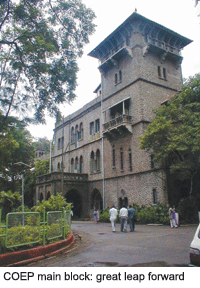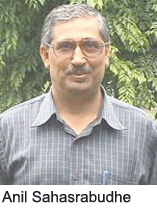Promoted as the Poona Engineering Class and Mechanical School in 1854, COEP has since acquired near IIT reputation and is on the threshold of being awarded deemed university status
 A low-profile institution of engineering and technical education which has acquired near IIT reputation and is on the threshold of being awarded deemed university status, is the College of Engineering Pune (COEP, estb. 1854). Sprawled over 36 green acres at the confluence of the rivers Mula and Mutha, which enables its Boat Club to be rated among the best in India, COEP was granted full autonomy status by the government of Maharashtra and the University Grants Commission in 2003, and has been selected as a lead institute under the Union government’s TEQIP (Technical Education Quality Improvement Programme) project.
A low-profile institution of engineering and technical education which has acquired near IIT reputation and is on the threshold of being awarded deemed university status, is the College of Engineering Pune (COEP, estb. 1854). Sprawled over 36 green acres at the confluence of the rivers Mula and Mutha, which enables its Boat Club to be rated among the best in India, COEP was granted full autonomy status by the government of Maharashtra and the University Grants Commission in 2003, and has been selected as a lead institute under the Union government’s TEQIP (Technical Education Quality Improvement Programme) project.
Next on the agenda of this island of academic excellence: acquiring deemed university status which will empower the COEP management to formulate its own curriculums, conduct its own examinations and award degrees. “We want to be as good as any Indian Institute of Technology,” says Anil Sahasrabudhe, director of COEP. “The fact that the IITs have managed to reach out to only 2 percent of the population in the past half century while there is a huge talent pool across the country, has inspired us to strive consistently to raise teaching-learning and research standards,” he adds.
Having drawn up a targets-driven investment and strategic growth plan, COEP is now on the threshold of a great leap forward. “COEP will soon be acknowledged as among the finest institutions of engineering and technical education in India and this will propel the college towards its future,” avers Sahasrabudhe. An alumnus of the Indian Institute of Science, Bangalore, Sahasrabudhe was director of IIT-Guwahati prior to signing up with COEP in 2006.
Promoted as the Poona Engineering Class and Mechanical School in 1854, before any of the formal degree-awarding universities struck root in the country, COEP began its long academic innings as a training school for subordinate officers of the PWD (public works department) in three small detached houses in Poona (aka Pune). In 1865 the school was awarded the status of a college when its foundation stone was laid by the Bombay Presidency governor Sir Bartle Frere, and Theodore Cooke MA was appointed its first principal, a post he held for 28 years.
In 1911, all non-engineering study programmes were closed and the college was christened the College of Engineering, Poona. It was initially affiliated to Bombay University for a licentiate in civil engineering degree (LCE), and in 1949 was affiliated with the University of Poona. Currently COEP, which has 2,500 students (including 1,400 resident on campus) instructed by 142 faculty on its muster roll, offers a four-year bachelor of technology (B.Tech) degree programme with a choice of nine engineering disciplines — civil, mechanical, electrical, electro-nics and telecommunication, metallurgy and material science, instrumentation and control, computer, production engineering and information technology.
 “Every B.Tech programme student is obliged to study the basics of mathematics, physics, chemistry and biology (living machines) in the first year on parallel terms with a course in the fundamentals of computer programming and languages. Coupled with these are courses in sociology, psychology and economics to produce knowledgeable and well-rounded technocrats,” says Sahasrabudhe.
“Every B.Tech programme student is obliged to study the basics of mathematics, physics, chemistry and biology (living machines) in the first year on parallel terms with a course in the fundamentals of computer programming and languages. Coupled with these are courses in sociology, psychology and economics to produce knowledgeable and well-rounded technocrats,” says Sahasrabudhe.
The institute also offers a two-year postgraduate M.Tech degree programme with a current enrolment of 18 students. Graduates are admitted through the All India Graduate Aptitude Test in Engineering (GATE) or as sponsored candidates of corporates.
The stellar academic reputation COEP has built over 155 years is enabled by excellent infrastructure. With an annual budget of Rs.22 crore, the campus boasts scenically sited residential accommo-dation for 1,400 students, a large playground with courts for tennis, basketball and volleyball, a state-of-the-art auditorium with a seating capacity of 1,000 and the nationally famous Boat Club which houses an indoor badminton court and gymnasium. Moreover the college features an excellent fully-wired library with a collection of 96,497 books, 451 dissertation papers and 73 international and 49 national journal subscriptions.
Not surprisingly, the roll call of its eminent alumni is impressive, including brilliant engineer-builder Sir M. Visvesvaraya, who graduated during the late 1880s in civil engineering. Moreover, following the grant of autonomous status in 2002 and the constitution of its first board of governors, Fakir Chand Kohli, the founder-director of Tata Consultancy Services Ltd — India’s largest IT software development and consultancy services behe-moth (revenue: Rs.30,000 crore for year ended March 31, 2009) — consented to become the first chairman of the board.
Now with deemed university status round the corner, the COEP management is all set to establish itself as a centre of industrial research. To this end it has signed research partnership agreements with some of the most reputed companies in Indian industry including Neilsoft, TCS, BSNL, Tata Elexi, Kirloskar Brothers, Emerson and Larsen & Toubro.
“Now a 150-year-old legacy under autonomous status is geared up to face the ever-changing socio-economic environment. Acting proactively would now mean addressing the following issues: dynamism in curriculum to excite and challenge the intellect of the student-community; developing alter-native teaching techniques; greater focus on imparting skills and knowledge rather than assessment methodology; exploring the immense goodwill of well-placed alumni for further growth of the institute; stren-gthening institute-industry interaction and upgrading the institute into a top-class research academy,” says Kohli.
Quite clearly 155 years on, this pioneer engineering college’s best days are ahead.
|
Admission & fees
College of Engineering, Pune offers B.Tech and M.Tech programmes in nine engineering disciplines. Admissions are usually held in the months of June-July. Undergraduate (B.Tech) admissions are based on scores secured in the Maharashtra Common Entrance Test (MH-CET) while for Masters programmes admission is on the basis of GATE scores.
Fees including tuition and other charges (per year): Rs.67,800
Residential fees (per year):Rs.8,000
For further details visit www.coep.org.in
|
Huned Contractor (Pune)